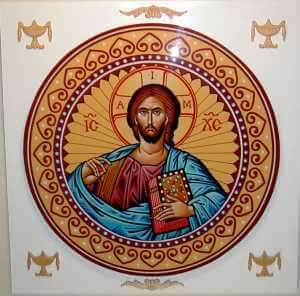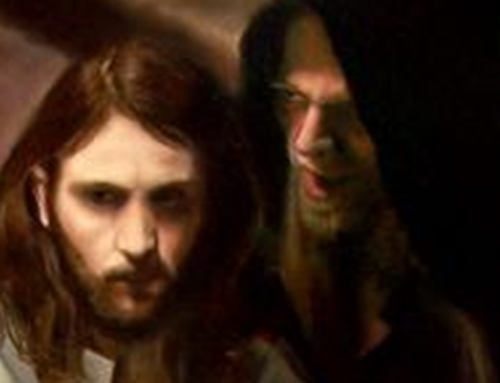The feast of Christ the King is not as big as Easter or Christmas, and was only instituted in 1925. It is, however, still considered of great importance, as a kind of grand finale of the liturgical year. The church in Wales and some Lutheran churches celebrate the 4 Sundays preceding Advent as the season of the Kingdom. The Methodist “Kingdomtide” may even begin as early as August.
 What starts with the expectation of the first coming of Christ, must end with his second coming. What starts with a humble birth in a stable and breaks through in the resurrection must one day result in what St. Matthew calls “the coming of the Son of Man in his glory, and all the angels with him”. Therefore the right liturgical colour for today is not green, but red or white. Fortunately my blue Reader scarf goes with any other colour. Besides, blue is the colour of the sky, and that fits in very nicely with today’s subject, which is after all the kingdom of heaven.
What starts with the expectation of the first coming of Christ, must end with his second coming. What starts with a humble birth in a stable and breaks through in the resurrection must one day result in what St. Matthew calls “the coming of the Son of Man in his glory, and all the angels with him”. Therefore the right liturgical colour for today is not green, but red or white. Fortunately my blue Reader scarf goes with any other colour. Besides, blue is the colour of the sky, and that fits in very nicely with today’s subject, which is after all the kingdom of heaven.
However, the important thing today is to listen to what Jesus himself declares in Mt. 25.
The passage starts with Jesus speaking about himself in the third person as “the Son of Man”. We find this title in three of the four gospels and it is Jesus’ favourite designation of himself. Although some Jews understood it as a name for the coming Messiah, we can also take it very literally. A Son of a man is himself a man. Jesus, even when speaking of his kingship, never forgot about his own incarnation and his humanity, his being one of us.
Because of this humility, the letter to the Philippians says, “Therefore God has highly exalted him and bestowed on him the name that is above every name, so that at the name of Jesus every knee should bow, in heaven and on earth and under the earth, and every tongue confess that Jesus Christ is Lord, to the glory of God the Father.” And it is precisely this high status that Jesus is referring to in Matthew 25.
The kingship that was foreshadowed by his triumphant entry in Jerusalem, will once become manifest. When Pilate had asked him, “are you the king of the Jews?” Jesus had replied, “You have said so”. And here in Matthew 25 Christ still does not explicitly refer to himself as king. He makes the point indirectly, by referring to his glory and his throne. In the Old Testament the king of heaven was invariably identified with God (the Father). But in the Book of Revelation we read about Christ sitting with the Father in one throne. So his kingship is the Father’s kingship, just as Jesus’ words had been the Father’s words.
I wonder what thoughts are triggered in your mind when the word ‘king’ or ‘queen’ is mentioned. Some of you may be reminded of kings or queens in fairy tales. Maybe when you were little you liked to imagine that you had a royal couple as your parents and that would make you a prince or princess. But you may also remember Hans Christian Anderson’s tale about the clothes of the emperor. This fairy tale exposed the hypocrisy and vanity of many kings and other dignitaries. Almost no-one wanted to admit that the emperor wasn’t wearing any clothes, not even the emperor himself, until one innocent child dared to call out that the emperor was in fact naked.
But vanity and hypocrisy are only mild problems compared to the greed, ruthlessness and intoxication with power that many kings and queens and other rulers have displayed through the ages, including kings in Israel, emperors of the Roman Empire and various rulers in the present age. Perhaps it is even fair to say that many heads of state and some leaders of the church live their life as if the laws that govern their subjects or followers don’t apply to them. How often do we not hear of fraud, scandals, cruelty or insensitive arrogance at the highest levels of our society?
Young people may associate the word “king” with the popular TV series “Game of thrones”. Although these series contain a lot of cruelty, strife, adultery and deceit, my impression is that reality can be equally bizarre, but we don’t always know about it until much later. Neither do we really want to know. Most people like to think that “our” leaders are the good guys and others are the bad guys.
A little bit like the fairy tale about the emperor’s clothes. And let’s be honest, do you want to be known as “those who always find something to complain about”? But let’s rephrase the question. What would we really want a king to be like, if we could choose?
I think we would want to feel safe with him, whether the dangers come from the outside or from within our country. We would want a king to actively promote justice and welfare, rather than just have a ceremonial function or leave things to the free market and occasionally lecture us about cooperation. A good king would hold a nation together by giving a good example as well as using his power to protect the weak. Today there are not many such leaders. Some do not have enough power and those who do, often use it insufficiently or towards the wrong ends, for instance just to hang on to that power. So when Christ comes and tells us He is king, we may not fully grasp its significance. How can we be enthusiastic about yet another person with authority but not living in our world?
According to the Bible, a good king should be a king in the tradition of David, namely a shepherd. A shepherd does some pretty unbelievable things, that a “normal” king might not think of, namely to bind up the injured, to strengthen the weak and to destroy the fat and the strong. These are not my words, but the words of Ezekiel. They are similar to “sending the rich empty away” in the Magnificat. Rather uncharacteristic for kings, as they tend to need the strong and wealthy as a basis of power. But our Lord does not need these corrupting influences in order to have power and glory.
Another thing not characteristic for human kings at all, is that Christ adopts everyone as his children. That means he also has to share his inheritance with countless people. You would think it would fragment and squander his kingdom. But His kingdom is not held together by possessions, but by love. Love only increases when it is shared. This is a secret that the profane world can never fully grasp. “Down here” we are still working on the basis of artificial shortages and competition.
But the difference is even more dramatic when we consider how we were adopted as children of God. At one time all people were meant to be created children and heirs of God, but humanity failed to live up to it. Christ was the uncreated Son of God, and when He was born He became “the second Adam.” Through Him we were able to make a new start. So you see, the adoption is really a restoration. Compare it to the parable of the prodigal son, where the son is restored into the family.
Like the father in the parable, God gave us his inheritance ahead of time. In reality it happens twice. First we received this world to look after, which we don’t manage to do terribly well, and in the end we will also receive the kingdom of God. Normally an inheritance is only distributed at someone’s death. But if the Triune God wants us to be spiritually rich, He will have to bestow these riches on us during his life, as He lives forever, and otherwise we would never receive any inheritance.
The true extent of our destination and the nature of the inheritance is beyond our imagination. The book of Revelation clearly states (3:21), “He who overcomes, I will grant to him to sit down with Me on My throne, as I also overcame and sat down with My Father on His throne.” You may wonder, is it not pretentious to think we can sit on the throne of God, with Christ? Actually, no, it isn’t. What is pretentious is wishing to sit there instead of God, or apart from Christ. It is pretentious to think we are all-powerful when we can change DNA or control the media. And it is pretentious to say we are divine when we do not listen to the prophets and to the Messiah. But to get there with Christ, after being victorious with Christ, is actually our high calling.
So what is necessary to overcome with Christ? Well, in the previous verse Christ says, “Behold, I stand at the door and knock; if anyone hears My voice and opens the door, I will come in to him and will dine with him, and he with Me.” The requirement is simply to listen to Christ’s voice, let Him enter your world and have diner together. Here we have the word, the sacrament and an opening up to the transforming work of the Spirit. Note that the word and the sacrament are not enough. The church in Laodicea probably already celebrated the Eucharist on a regular basis. And still Christ says to them: “Let me come in and we will eat together. Over diner we will talk.” The role of the Holy Spirit is further explained in our reading from the Ephesians: He or She marks us with a seal. And St. Paul goes on to say that this is like a pledge which ensures our inheritance as God’s own people!
If this does not show how much God loves us and what there is in store for us, I don’t know what will. The challenge is, however, to also see each other as heirs of the kingdom, as princes who will share one throne, with one not threatening the position of the other. If we could see each other that way, and if our governments could see their poorest subjects that way, what a different world we would have.
What Christ tells us, now and in the time of judgement, is that the way we have viewed and treated other people, that’s the way He will consider us to have treated Him. When we harm one of the least of his sheep, we will have harmed Him. Then it will be confirmed that people were not objects to be discarded when no longer “useful”, no “human resources”, but precious individuals, brothers and sisters of the new king and the people of his pasture.
Let us pray that, by the grace of God , “the mystery of His will” and His “plan for the fullness of time” will be more widely understood and acted upon, and Christ will be recognized as the King of all our hearts and minds, to the glory of the Father, the Son and the Holy Spirit.
Amen.





Leave A Comment